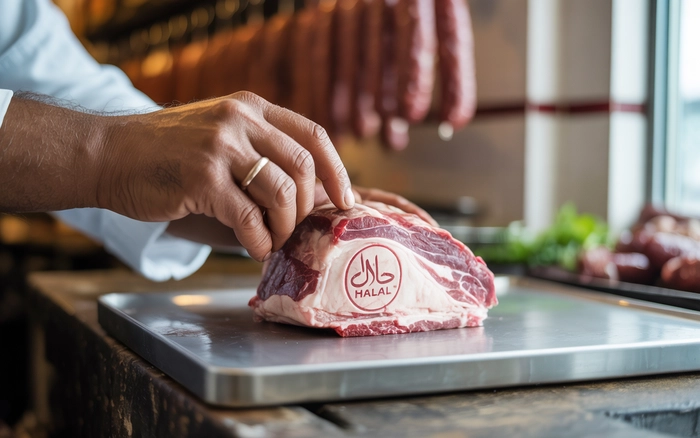Beyond the Blade: What 'Halal' Truly Means
For many, the word "Halal" brings to mind a specific image: the method of slaughter for meat. While this is a crucial component, it’s only one piece of a much larger, more profound puzzle. The true meaning of Halal extends far beyond the butcher's knife, embodying a holistic philosophy of ethics, purity, and mindfulness that touches every aspect of a Muslim's life. For your online meat delivery service in Bangalore, understanding and conveying this deeper meaning is key to building trust and connecting with a discerning audience that values more than just a label.
So, what does 'Halal' really mean? Let's explore its true essence.
Halal: More Than a Rule, A Way of Life
The Arabic word Halal (حلال) literally translates to "permissible" or "lawful" in English. It is a foundational concept in Islam that governs not just what to eat, but also how to live. It stands in contrast to Haram (forbidden), and together, these principles provide a framework for a life that is ethical, just, and pleasing to God.
This framework encompasses a wide range of life's activities, from business dealings and financial transactions to personal conduct and, of course, dietary laws. At its core, Halal is about ensuring that what we consume and how we live is pure, wholesome, and beneficial for our well-being – spiritually, mentally, and physically.
The Divine Connection: The Principle of 'Tayyib'
To fully grasp the concept of Halal, we must introduce its inseparable partner: Tayyib (طَيِّب). The Qur'an often uses these two words together, instructing believers to consume that which is "Halalan Tayyiban"—lawful and good.
- Halal addresses the legality of the source and the process.
- Tayyib refers to the intrinsic quality, purity, and wholesomeness of the item.
Something can be technically Halal, but if it's not Tayyib, it's not ideal. For example, meat from a Halal-slaughtered animal that was mistreated, lived in unhygienic conditions, or was fed unnatural substances would not be considered Tayyib. This divine principle encourages us to seek out food that is not only permissible but also pure, natural, and nourishing.
The Pillars of Halal in Practice
When we apply this holistic understanding to meat, we see a much broader set of principles emerge, moving far beyond the final act of slaughter:
-
Humane Treatment of Animals: Islam places great emphasis on animal welfare. A core tenet of Halal is that the animal must be treated with kindness and respect throughout its life. This includes providing clean living conditions, sufficient space to roam, natural feed, and fresh water. Causing stress, fear, or pain to the animal at any stage is strictly against the principles of Halal and Tayyib.
-
The Method of Slaughter (Dhabihah): This is the most widely known aspect. The slaughter must be performed by a sane adult Muslim, who invokes the name of God ("Bismillah") at the moment of slaughter. A swift, deep incision with a razor-sharp knife to the throat, cutting the jugular veins, carotid arteries, and windpipe, ensures a rapid and humane death. This method also allows for the complete drainage of blood, which is considered impure and a carrier of toxins and bacteria.
-
Absolute Prohibition of Certain Substances: Halal strictly forbids the consumption of pork and its by-products, blood, carrion (animals that have died of natural causes), and animals that have been strangled or beaten to death. Furthermore, any food or drink containing alcohol or other intoxicants is considered Haram.
-
Hygiene and Purity: The entire process, from the farm to your doorstep, must adhere to strict standards of hygiene. This means that the facilities, tools, and storage units used for Halal meat must be clean and free from any potential cross-contamination with Haram substances.
The Benefits: Why Choose Halal?
For consumers in a bustling city like Bangalore, choosing genuinely Halal meat offers benefits that extend beyond religious observance:
- Enhanced Food Safety: The emphasis on hygiene and the complete draining of blood can lead to a lower risk of foodborne illnesses and a product that stays fresh for longer.
- Ethical Peace of Mind: Knowing that the animal was raised and treated humanely resonates with a growing number of consumers who are conscious of the ethical implications of their food choices.
- Superior Quality and Taste: Many believe that the stress-free environment for the animal and the thorough bleeding process result in meat that is more tender, flavourful, and of a higher overall quality.
Conclusion: A Commitment to Wholesomeness
"Halal" is not just a stamp on a package; it's a promise. It's a promise of ethical treatment, uncompromising hygiene, and a commitment to providing something that is both permissible and pure. For your customers in Bangalore, it's the assurance that the food on their table is not only delicious but also aligns with principles of compassion, well-being, and divine guidance. By embracing and sharing this deeper meaning, your brand can build a foundation of trust and become a truly respected name in the community.



